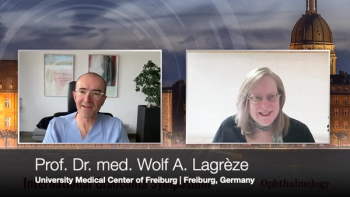
IKA Keratoconus Symposium 2023: Key insights into the disease

Uri Soiberman, MD, shares some key takeaways from his presentation at the inaugural IKA Keratoconus Symposium.
Video transcript
Sheryl Stevenson:
We're joined today by Dr. Soiberman, who will be presenting at this year's first International Keratoconus Symposium, the IKA meeting, in Scottsdale in April. We'd love to hear a little about your presentation regarding the key insights into keratoconus. Can you tell us about that?
Uri S. Soiberman, MD:
Yeah, of course, Sheryl. I'm super excited to be first of all representing Wilmer [Eye Institute] at this conference. I think that this is the first time that so many people are joining together and meeting together in one place to talk only about keratoconus, which is really the center of my clinical practice and my research. I will be presenting key insights into the disease, into the pathogenesis of keratoconus. I think that I have these two hats. I'm both clinician and scientist researching keratoconus so I would probably be able to say a thing or two about the disease process.
I'm going to review a lot of the literature on what causes keratoconus, which is a disease, but it's very enigmatic. We don't quite know what causes it. There [are] a lot of data suggesting that there are a few wound healing pathways that are involved in this disease process. I'm going to be reviewing that and then I will be presenting data from our lab that is implicating wnt signaling in the disease process and also other collagenopathies and specifically deficiency of collagen type XII in keratoconus. I hope that this will be an interesting talk and I'm looking forward to seeing all of you out there.
Stevenson:
That's wonderful. What are some of the key takeaways that you would hope attendees bring back to their practice on Monday morning?
Soiberman:
I think that the key takeaway is that we're doing a lot of research to produce new therapies for keratoconus. Right now, in terms of treatment, we don't have too many options. We have good treatments for severe disease. In terms of how we rehabilitate vision of these patients, we don't have good treatments to prevent progression. The only one is cross-linking. It's a surgical treatment, but we really want is [eye] drops for keratoconus. The key takeaway is I think that in the next 10 to 20 years, we'll have new innovative treatments in the form of drops for these patients who desperately need them.
Newsletter
Don’t miss out—get Ophthalmology Times updates on the latest clinical advancements and expert interviews, straight to your inbox.





























